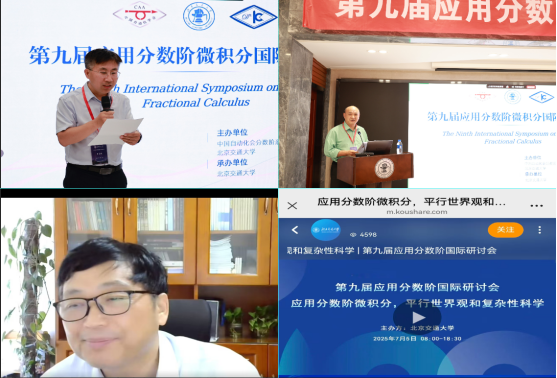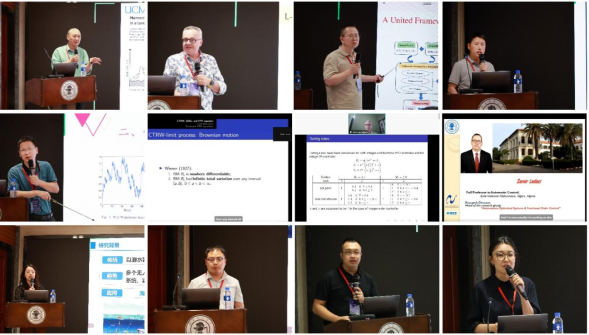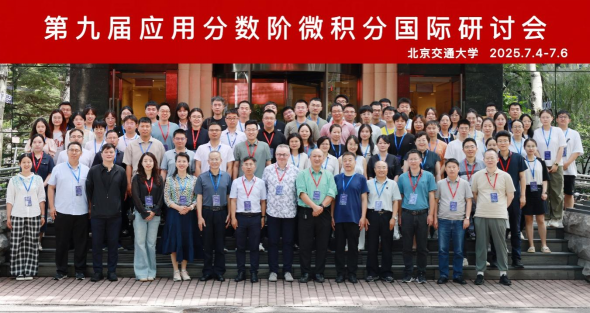
School News
Beijing Jiaotong University Hosts the 9th International Symposium on Applied Fractional Calculus
From July 4 to 6, 2025, the 9th International Symposium on Applied Fractional Calculus was held in Beijing Jiaotong University. Co-organized by the Technical Committee on Fractional Order Systems and Control of the Chinese Association of Automation and Beijing Jiaotong University, this international conference aimed to advance fractional calculus research and foster global academic collaboration.
Initiated in 2016 by Professor YangQuan Chen from the University of California, Merced (UC Merced), the symposium has been held nine times with Beijing Jiaotong University as its founding host. Over the past decade, the event has grown significantly from dozens of participants to attracting over 200 scholars from more than 10 countries, including the United States, Poland, Italy, and Algeria, along with over 50 Chinese institutions. Now, it has established itself as a premier global platform in this field.
The symposium brought together experts and scholars from countries and regions like the United States and Poland, along with over 200 representatives from more than 50 universities and research institutions across China, including the University of Science and Technology of China, Southeast University, Harbin Institute of Technology, and Tianjin University. Additionally, the event was livestreamed online, reaching an audience of over 4,500 at its peak.
The opening ceremony featured speeches by Professor Yu Yongguang, Dean of the School of Mathematics and Statistics at Beijing Jiaotong University, Professor YangQuan Chen from UC Merced, and Professor Wang Yong from the University of Science and Technology of China. Professor Yu Yongguang provided a brief overview of the School of Mathematics and Statistics. On behalf of the School, he extended a warm welcome to the conference speakers and participating experts, concluding with his sincere wishes for the flourishing development of fractional calculus. Professor YangQuan Chen highlighted the significance of fractional calculus research. He described the symposium as a platform to explore cutting-edge topics and findings in fractional order systems and control, while fostering international academic collaboration. Professor Wang Yong delivered a virtual address, emphasizing the symposium's role as a valuable opportunity for academic exchange, serving as a bridge for profound discussions and intellectual engagement among scholars. Professor Wang Yong also expressed special gratitude to Beijing Jiaotong University for providing an academic exchange platform and extended best wishes for the symposium's success. He anticipated the event would spark innovative thinking and yield substantial academic achievements among participating scholars.

Following the opening ceremony, insightful academic presentations were delivered by Professor YangQuan Chen from UC Merced, Professor Paweł D. Domański from the Warsaw University of Technology, Professor Gao Fei from the Wuhan University of Technology, Professor Liang Yongshun from the Nanjing University of Science and Technology, Professor Nie Xiaobing from the Southeast University, Professor Sabir Umarov from the University of New Haven, Professor Antonio Visioli from the University of Brescia, Professor Samir Ladaci from the National Polytechnic of Algeria, Professor Liu Lu from the Northwestern Polytechnical University, Dr. Xie Da from the Xi'an Technological University, Dr. Yu Zhe from the Harbin Institute of Technology (Shenzhen Campus), and Dr. Cui Yibing from the School of Mathematics and Statistics at Beijing Jiaotong University. They provided comprehensive insights into the research and applications of fractional calculus from diverse perspectives and dimensions.

In his keynote report titled "Control Theory for Machine Learning (CT4ML): From Integer Order to Fractional Order", Professor YangQuan Chen emphasized the dual importance of examining AI/Machine Learning's (AI/ML) impact on control systems (ML4Control) while exploring how control theory can enhance AI/ML (Control4ML), describing their relationship as two inseparable sides of the same coin. The tutorial-style report framed ML processes as controllable dynamic systems, demonstrating how Integer Order Control Theory (IOCT) and Fractional Order Control Theory (FOCT) can be leveraged to design high-performance ML algorithms with provable stability, robustness, and efficiency.
Keynote speakers presented their latest research breakthroughs and innovative perspectives in applied fractional calculus during the conference. Participants actively engaged in discussions and exchanged insights on topics of interest from both theoretical and applied perspectives, fostering a vibrant academic atmosphere. They also explored emerging trends and cutting-edge developments in related research fields, offering valuable insights for students' academic and research pursuits.
The symposium concluded with closing remarks by Professor Yu Yongguang from Beijing Jiaotong University and Professor YangQuan Chen. It featured in-depth discussions on fractional calculus applications across multiple domains including control theory, ML, neural networks, image processing, and robotic path planning. Key topics included ML applications of IOCT, fractional calculus properties of fractal functions, and finite-time multistability in fractional neural networks. These studies have enriched the theoretical framework of fractional calculus while offering novel approaches to addressing practical engineering and scientific challenges, thereby advancing academic discourse and progress in the field.

This symposium has not only elevated our university's global academic standing but also garnered widespread recognition and acclaim for both the institution and its affiliated schools. The symposium also served as a vital platform for young scholars and students to engage in direct exchanges with world-renowned experts. Through these in-depth discussions, participants broadened their academic perspectives by absorbing cutting-edge research insights and generating innovative ideas.

